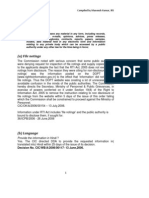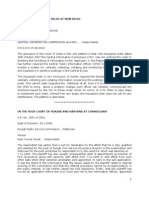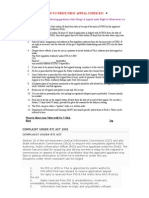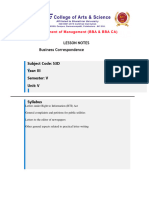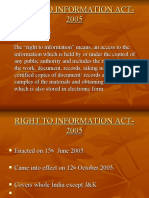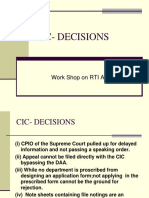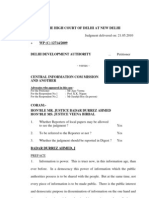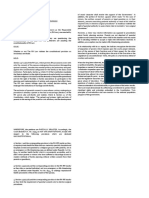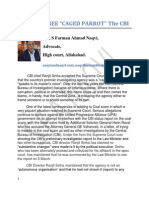Central Information Commission: Section 4
Central Information Commission: Section 4
Uploaded by
vheejay.vkhisti1070Copyright:
Available Formats
Central Information Commission: Section 4
Central Information Commission: Section 4
Uploaded by
vheejay.vkhisti1070Original Description:
Original Title
Copyright
Available Formats
Share this document
Did you find this document useful?
Is this content inappropriate?
Copyright:
Available Formats
Central Information Commission: Section 4
Central Information Commission: Section 4
Uploaded by
vheejay.vkhisti1070Copyright:
Available Formats
Section 4
Section 4 Central Information Commission Appeal No. 10/1/2005-CIC Complaint No. CIC/LS/C/2009/00322 dated 8-52009 RequestInformation concerning ongoing modification of the Master Plan of Delhi till the year 2021 (MPD-2021). He also sought directions to DDA to fulfill its mandatory obligations under the Act including proactive disclosures. Subsequently, the appellant submitted that the orders of this Commission in Appeal No. 10/1/2005-CIC announced on 25-2-2006 have still not been complied with. Not only in the decision of 25-2-2006 which is quoted above but also in decisions in file Nos. CIC/WB/C/2008/00115/LS and 50 others disposed of in the same order of 9.4.09. DecisionIn exercise of its powers conferred under section 19 (8) (e) of the Act, the Commission hereby requires the Public Authorities to, inter alia, take the following steps in this regard:(i) Since a reasonable time has now passed from the time of promulgation of the Act in 2005, the Public Authorities should now take urgent steps to have their records converted to electronic form, catalogued, indexed and computerized for easy accessibility through the network all over the country, as mandated in section 4 (1) (a) of the Act. The computerization, dissemination and updating of record is an ongoing and continuous process and all Public Authorities should put a proper system in place to make such sharing of records an automatic, routine and continuous process, so that access to such records is facilitated. (ii) The Public Authorities are required to take immediate steps to publish detailed, complete and unambiguous information under the 16 categories, as on 31.3.2009 (if already not done or partially done) and thereafter update the information as and when necessary, but definitely every year, as mandated under section 4 (1) (b) of the Act. (iii) While formulating important policies or announcing the decisions affecting the public, the Public Authorities are required to publish all relevant facts about such policies and decisions for the information of public at large, as mandated under section 4 (10) (c ) of the Act. (iv) The information disclosed by the Public Authorities under section 4 (1) (b) & (c ) of the Act is required to be disseminated through multiple means as provided under sub sections 2, 3 and 4 of Section 4 of the Act and as also suggested in Para 17.1 of the template prepared by the Tata Consultancy Service Ltd (Reference Para 14 above)/ or as per the practice adop0ted by the Government of Andhra Pradesh and the Andhra Pradesh State Information Commission (reference Para 13 above). (v) Needless to say, the information disclosed by the Public Authorities under section 4 (1) (b) & (c ) of the Act is a proactive disclosure and the Public Authorities are required to provide immediate access to this material as and when so requested ,without the requirement of filing of any written request and the charging of any fee. (vi) The notice board (s) in the offices of all the public Authorities should display as much information as practicable about suo motu disclosures under section 4(1)(b) & (c).
Significant Decisions of Information Commissions
Section 4
Further, this information could also be placed in the Library or Reading Room, if such facility exists, for the public convenience. The Public Authorities would, however, be at liberty to take any other steps that may be necessary and expedient for fulfilling the mandate of section 4 of the Act in the matter of suo motu disclosures of information and dissemination thereof, depending on the specific requirements of such Public Authorities. (vii) The names, room numbers, telephone numbers, e-mail addresses of the CPIOS/ACPIOS and Appellate Authorities may be prominently displayed in each office for the convenience of the public at large. If the complete disclosures of 4(1), (b) & (c) are also available with any other officer (s) other than the CPIOS/ ACPIOs, the names, designations, room numbers and telephone numbers of such officers must be prominently displayed in the offices for easy contact ability. Order Dt.2.8.2009. RequestProject wise information about MLA Local Area Development Scheme to be put up on the Delhi governments website and on boards in each constituency, to ensure transparency in the utilization of MLA local area development funds. DecisionIssuing a show cause notice to the PIO of the Urban Development Department, the Commissioner noted that the PIO is guilty of not making any effort to meet the Section 4 requirements (of the RTI Act). The PIO has been ordered to ensure that this information is put up on the website of the Department within 15 days. The order of the CIC will ensure that MLA local area development funds are utilized in a consultative, participatory and accountable manner. Over Rs. 700 crore is allocated by MLAs under the Delhi MLALAD Scheme over a five year period. Having access to information on these funds will enable people to meaningfully engage with their MLAs to ensure that these funds are spent on their areas most pressing development needs. The PA should proactively provide information on utilization of public funds to citizens. CIC/OK/A/2006/00016- 15.6.06. Record management system ought to be improved such that information which are to be disclosed could be easily provided after delineating those that is exempted. F.No.CIC/AT/A/2009/000200 Dt. 30.6.2009 RequestFiles pertaining to an ongoing disciplinary proceeding involving the appellant. DecisionConsidering the fact that these files are currently subject-matter of an ongoing enquiry, any action for disclosure of information thereof will surely impede the enquiry. The Enquiry Officer is entitled to conduct the enquiry as per the procedure established by the Rules governing conduct of such enquiries without any intrusive probing by the officers enquired into or by third-parties. This is consistent with the decision of the Commission in V.K. Gulati Vs. DG Vig. Customs & Central Excise; Appeal No. CIC/AT/A/2007/01508; Date of Decision: 17.06.2008 That file-notings in vigilance and enquiry-related files, which are held confidentially by a public authority, must not be allowed to be disclosed to the employee or to any other seeking that information.
Significant Decisions of Information Commissions
Section 4
The reason for that is sanguine. First, such disclosures serve no public interest. The employees personal interest cannot be conflated with public interest. Second, such disclosures undeniably cause injury to the interest of the third-party, who holds these file-notings in certain special category of files, i.e. vigilance and enquiry-related files, confidentially. The officers and members of the staff who make such notings perform the thankless task of commenting on the conduct, reputation, behaviour of the officers enquired into apart from analyzing the evidence in order to help the competent authority make an informed decision. Such comments and remarks recorded by officers, if disclosed to the very person against whom these are recorded, have the potentiality of being used by the employee to start legal processes against these officers for charges such as defamation, criminal conspiracy and so on. There is also a chance that the officer enquired into attempt to seek vengeance against those who recorded adverse notes against him in the note-files. The vengeance can take several forms, such as physical and mental threats, causing annoyance, long and expensive judicial proceedings and so on. Even if such actions of the employees or others sympathetic to them, do not yield any useful result to them; as long as these actions last, they cause boundless anxiety, annoyance, physical discomfort and stress to the officers for no fault of theirs, and in true fact, for doing their job ably, honestly and conscientiously. Anonymity of officers recording file-notes deserves to be protected in their own interest as well as the interest of the system they serve. There is, therefore, enough reason to conclude that disclosure of confidential file-notings in vigilance, investigation and enquiry-related files, attracts the first proviso of Section 11(1), i.e. it possessing the power to inflict possible harm or injury to the interests of such third-party. The public authority is duty-bound to protect the interests of its officers who examine through their notings in files the conduct of other employees of the public authority and thereby expose themselves to possible revengeful action by those whose conduct they bring under scanner. Appeal No.908/ICPB/2007-F.No.PBA/07/211-17.9.2007The CIC reiterated its earlier decisions stating that if the information sought relates to a pending proceeding before a competent court/tribunal, then the said information should be obtained only through court /tribunal and not under the provisions of the RTI Act. Decision No. CIC /WB/A/2008/00838/1777 The appellate authority had claimed exemption under Section 8 (1) (e), but the PIO has given no reason to justify how Section 8 (1) (e) can apply. The CIC decision cited by the respondent states The matter is sub judice. The appellate authority has correctly advised that information in question could be obtained through Court, which is examining the matter. No reasoning has been offered as to which exemption clause of the RTI act applies. The only exemption of Section 8 (1) which might remotely apply is Section 8 (1)(b) which states, information which has been expressly forbidden to be published by any court of law or tribunal or the disclosure of which may constitute contempt of court; can be denied. This clause does not cover sub judice matters, and unless an exemption is specifically mentioned, information cannot be denied. Disclosing information on matters which are sub judice does not constitute contempt of Court, unless there is a specific order forbidding its disclosure. I respectfully have to disagree with the earlier decision cited by the appellant since it is per incuriam. This Commission rules that a matter being sub judice cannot be used as a reason for denying information under the Right to Information Act.
Significant Decisions of Information Commissions
Section 4
F.No. CIC/AT/ A/2006/00500 Dt.16.01.2007 Request-Copies of complaint lodged by the applicant and action taken on the same. The Commission has been approached by Government servants facing investigations, departmental action and other enquiries, to know the names of those who filed complaints against them. DecisionSuch disclosures, if allowed, have the potentiality to put at risk the interest and the physical safety of those who file such complaints. There are specific provisions in various Laws, Rules, Orders and instructions regarding the entitlement of a person facing an enquiry, investigation or disciplinary action for documents, records, etc. What he can access and cannot access is also specified. On the other hand, the RTI Act makes an omnibus provision regarding disclosure of all variety of information to a requester, who can also be a person facing investigation etc., but quite cautiously limits this right through certain exemptions. The eligibility of such persons to access information as requested is to be determined under the provision of the RTI Act regardless of what the other Laws may prescribe. The two eligibilities are best examined independently. An employee facing disciplinary action at the hands of his superiors may wish to invoke the RTI Act to access the file/records in which his case may be dealt with, but will be hindered by the exemption provided under Section 8(1)(j) since the information sought would be personal to him with no relationship to any public activity or interest. The appeal is consequently rejected.
Kerala State Information Commission Ref: AP.No.737 & 740(4)/2008/SIC (File No.6909 & 5300/SIC-Gen3/2008): Shri. K. Unnikumaran vs. Tahsildar, Chittoor: Order dated 19 March 2009 Appellant wanted the copies of documents submitted by a third party in 1999 for a possession certificate and details of documents that were inspected by the concerned Taluk office for the purpose. SPIO replied that the request and the documents produced in support of it were not available in the Taluk office and the information could not be provided. Appellant argued that documents purported to have been produced for issuing possession certificate to the third party should have been kept by the Village Officer at least for a period of 20 years and the statement that no such document was available was in violation of the provisions of S.4 of the RTI Act. The RTI Act came into being on the 15th of June 2005. It was true that the modality for preservation of documents and maintenance of records in the office were illustrated in S.4 of the RTI Act. However, the Village Officer may be helpless in providing the information if the documents were not available in the said office. List of documents that might have been verified for issue of possession certificate by a revenue official are the usual documents to prove possession and hence an attempt to trace out the same was possible. Ref: A.P. No. 980(5)/2008/SIC (File No. 9557/SIC-G1/2008): Shri. M.N. Parthasarathy Vs. Municipal Office Muvattupuzha, Kerala : Order dated 5 February 2009 Appellant requested for the copy of the plan approved by the municipality for constructing a building State Public Information Officer informed the appellant on 7-7-2008 that the
Significant Decisions of Information Commissions
Section 4
information required was not available as it was lost. The Commission observed that the approved plan of the building, which has to be kept as a permanent record, is not available with the public authority. An approved plan is, absolutely, necessary to find out any subsequent violation in the construction, and, hence it has to be kept permanently. It cannot be simply stated that this document was lost during the shifting of the office. Therefore, the Commission orders that a thorough search shall be made by the State Public Information Officer and the Appellate Authority to find out the approved plan within 10 days and, if found available, authenticated copy of the plan should be provided to the appellant free of cost. If the record cannot be traced out, the Public Authority shall file an affidavit before the Commission, accordingly. It is also ordered that the Appellate Authority should keep all records as stipulated u/s. 4 of the RTI Act in future.
Significant Decisions of Information Commissions
You might also like
- 4 Kilusang Magbubukid NG Pilipinas V APECODocument3 pages4 Kilusang Magbubukid NG Pilipinas V APECOCJNo ratings yet
- Navagraha Mantra TransDocument3 pagesNavagraha Mantra Transjai100% (4)
- Vakalath HC PDFDocument2 pagesVakalath HC PDFGanti Santosh Kumar60% (10)
- People Vs NazarenoDocument2 pagesPeople Vs NazarenoCheza Biliran100% (1)
- RTI Handbook - BodyDocument28 pagesRTI Handbook - BodySuvir MisraNo ratings yet
- Guide for First Appellate AuthorityDocument9 pagesGuide for First Appellate AuthorityRmakant ChauhanNo ratings yet
- State Information Commission MaharashtraDocument2 pagesState Information Commission MaharashtraIraqui Arif NawazNo ratings yet
- First Appeal TEP RTIDocument8 pagesFirst Appeal TEP RTIMy CaseNo ratings yet
- RTIDocument4 pagesRTIVijay RoheriaNo ratings yet
- RDSO Internal Procedure For RTIDocument8 pagesRDSO Internal Procedure For RTIamtripathiNo ratings yet
- 115-125 DocumentsDocument11 pages115-125 DocumentsRobertNo ratings yet
- HC DecisionsDocument30 pagesHC Decisionsvheejay.vkhisti1070No ratings yet
- Unit No. V RTI ACT 2005Document6 pagesUnit No. V RTI ACT 2005augustrain058No ratings yet
- One Has To Follow The Following Guidelines While Filing 1st Appeal Under Right To Information Act 2005Document44 pagesOne Has To Follow The Following Guidelines While Filing 1st Appeal Under Right To Information Act 2005Hori LalNo ratings yet
- BL Unit IIIDocument19 pagesBL Unit IIIUday KumarNo ratings yet
- Unit VDocument16 pagesUnit VBala KrishnanNo ratings yet
- Names, Designation and Address of The Members of The Selection Committee of UPSC Cannot Be Provided Under A RTI Application Rules Delhi High CourtDocument13 pagesNames, Designation and Address of The Members of The Selection Committee of UPSC Cannot Be Provided Under A RTI Application Rules Delhi High CourtLive LawNo ratings yet
- Decision 32 2023 Ministry of Economy and Labour HQsDocument9 pagesDecision 32 2023 Ministry of Economy and Labour HQsAnonymous UpWci5No ratings yet
- Synopsis of Rti Act 2005-2nd Edition NewDocument13 pagesSynopsis of Rti Act 2005-2nd Edition NewhirentrvdNo ratings yet
- RTI Act FAQDocument10 pagesRTI Act FAQSarvesh ChoudharyNo ratings yet
- Most Immediate Time BoundDocument2 pagesMost Immediate Time BoundRajesh DubeyNo ratings yet
- Right To Information Act 2005Document42 pagesRight To Information Act 2005GomathiRachakondaNo ratings yet
- 7-CIC DecisionsDocument42 pages7-CIC DecisionsPuneet VasdevNo ratings yet
- Judgment Dt. 09.10.2023Document15 pagesJudgment Dt. 09.10.2023kishanjainNo ratings yet
- 14 2024 Bermuda Police Service 30 Apr 2024Document13 pages14 2024 Bermuda Police Service 30 Apr 2024BernewsNo ratings yet
- Section 04: Right To Information and Obligation of Public AuthoritiesDocument12 pagesSection 04: Right To Information and Obligation of Public AuthoritiesKajal GoswamiNo ratings yet
- IR Division 01122017Document158 pagesIR Division 01122017Pushkar MahajanNo ratings yet
- Satya Narain Shukla-JudgmentsDocument4 pagesSatya Narain Shukla-JudgmentsJyoti RaoNo ratings yet
- Request For Obtaining Information Under RTI ActDocument16 pagesRequest For Obtaining Information Under RTI ActAshishSharma100% (1)
- Therefore, The Request Made in The Aforementioned Application Cannot Be Acceded To at This Stage"Document5 pagesTherefore, The Request Made in The Aforementioned Application Cannot Be Acceded To at This Stage"Vivek SinghNo ratings yet
- RTI - Important CasesDocument26 pagesRTI - Important CasesRohyt SinghNo ratings yet
- Rti 1Document2 pagesRti 1diksoochilawNo ratings yet
- Right To Information Act-2005Document10 pagesRight To Information Act-2005prasad02rocksinNo ratings yet
- Abhishek Rti HonorsDocument12 pagesAbhishek Rti HonorsYavanika SharmaNo ratings yet
- Right To Information of Indian Bank Association: Submitted To Submitted byDocument7 pagesRight To Information of Indian Bank Association: Submitted To Submitted byAkhilesh MishraNo ratings yet
- Presentation 2Document21 pagesPresentation 2kuldeep jaglanNo ratings yet
- The High Court of Delhi at New Delhi: W.P. (C) 5547/2017 Page 1 of 8Document8 pagesThe High Court of Delhi at New Delhi: W.P. (C) 5547/2017 Page 1 of 8Nek PuriNo ratings yet
- Ch8. RIGHT TO INFORMATION ACT, 2005Document5 pagesCh8. RIGHT TO INFORMATION ACT, 2005sks.in109No ratings yet
- Right To Information Act, 2005 (No. 22 of 2005) : Salient FeaturesDocument37 pagesRight To Information Act, 2005 (No. 22 of 2005) : Salient FeaturesSuman R Suman RNo ratings yet
- Handbook LawDocument26 pagesHandbook Lawபூவை ஜெ ரூபன்சார்லஸ்No ratings yet
- The Registrar, Supreme Court of India v. Commodore Lokesh K Batra & Ors.Document12 pagesThe Registrar, Supreme Court of India v. Commodore Lokesh K Batra & Ors.Bar & BenchNo ratings yet
- Bihar RTI Rules - EngDocument14 pagesBihar RTI Rules - EngBeth MyersNo ratings yet
- 5 E5-E6 CSS RtiDocument5 pages5 E5-E6 CSS Rtisumit15sksNo ratings yet
- RTI SeminarDocument5 pagesRTI SeminarSneha IsabellaNo ratings yet
- These Are The 3 Ways of Filing An Rti-: Who Are Public Information Officers (Pios) ?Document9 pagesThese Are The 3 Ways of Filing An Rti-: Who Are Public Information Officers (Pios) ?RaGa JoThiNo ratings yet
- Central Information CommissionDocument6 pagesCentral Information CommissionMukul Pratap SinghNo ratings yet
- RTI2005Document7 pagesRTI2005Vivek RajagopalNo ratings yet
- Important Features of Rti ActDocument141 pagesImportant Features of Rti ActAditi SrivastavNo ratings yet
- RTI Salient FeaturesDocument3 pagesRTI Salient FeaturesKan KenNo ratings yet
- Business Environment RTI - 2014Document13 pagesBusiness Environment RTI - 2014Mohit KainthNo ratings yet
- Project Paper: The University of Burdwan Amex Law CollegeDocument10 pagesProject Paper: The University of Burdwan Amex Law CollegeSupriyo BiswasNo ratings yet
- Executive Order: Freedom of InformationDocument5 pagesExecutive Order: Freedom of InformationNational Citizens' Movement for Free Elections (NAMFREL)No ratings yet
- Media and LawDocument8 pagesMedia and LawDeepali ShindeNo ratings yet
- Freedom of Information ACT, 2011 Explanatory MemorandumDocument18 pagesFreedom of Information ACT, 2011 Explanatory Memorandumapi-214821744No ratings yet
- CIC Order DTD 25022006Document10 pagesCIC Order DTD 25022006tarunbhartiyaNo ratings yet
- Decision 04 2023 Department of HealthDocument11 pagesDecision 04 2023 Department of HealthBernewsAdminNo ratings yet
- Favk 88Document5 pagesFavk 88priyanshutyagi231001No ratings yet
- Cic-Decisions: Work Shop On RTI ActDocument51 pagesCic-Decisions: Work Shop On RTI Actrajsandhu25No ratings yet
- Rti ActDocument13 pagesRti ActiqbalNo ratings yet
- Freedom of Information ActDocument10 pagesFreedom of Information ActAdegboyega Moses SegunNo ratings yet
- The Right To Information Act, 2005Document16 pagesThe Right To Information Act, 2005girishcrisNo ratings yet
- Delhi High Court Order DDA Vs CICDocument48 pagesDelhi High Court Order DDA Vs CICAngaingaNo ratings yet
- Vkfa 91Document5 pagesVkfa 91priyanshutyagi231001No ratings yet
- A Layman’s Guide to The Right to Information Act, 2005From EverandA Layman’s Guide to The Right to Information Act, 2005Rating: 4 out of 5 stars4/5 (1)
- This Is What Happens To Your Brain When You MeditateDocument3 pagesThis Is What Happens To Your Brain When You Meditatevheejay.vkhisti1070No ratings yet
- The Six Enemies of GreatnessDocument2 pagesThe Six Enemies of Greatnessvheejay.vkhisti1070No ratings yet
- Surya Namaskar: A Panacea For Obesity and DiabetesDocument2 pagesSurya Namaskar: A Panacea For Obesity and Diabetesvheejay.vkhisti1070No ratings yet
- Poses in Yoga For RelaxationDocument10 pagesPoses in Yoga For Relaxationvheejay.vkhisti1070No ratings yet
- Moon Sign Favorable Unfavorable: AriesDocument3 pagesMoon Sign Favorable Unfavorable: Ariesvheejay.vkhisti1070No ratings yet
- 10 Anti Aging Fruits: Legumes, PulsesDocument2 pages10 Anti Aging Fruits: Legumes, Pulsesvheejay.vkhisti1070No ratings yet
- 16 - Santos Vs Bartolome, GR 18032, November 23, 1922Document2 pages16 - Santos Vs Bartolome, GR 18032, November 23, 1922romeo stodNo ratings yet
- Robert SpencerDocument7 pagesRobert SpencerMohammad MuqeemNo ratings yet
- Chugani vs. PDICDocument6 pagesChugani vs. PDIClouryNo ratings yet
- Business LawDocument47 pagesBusiness LawLinh VũNo ratings yet
- Title Seven Revised Penal Code. Crimes Committed by Public OfficersDocument10 pagesTitle Seven Revised Penal Code. Crimes Committed by Public OfficersDessa Ruth ReyesNo ratings yet
- Information SampleDocument2 pagesInformation SampleMoises ApolonioNo ratings yet
- Rio Declaration On Environment and DevelopmentDocument15 pagesRio Declaration On Environment and DevelopmentEllaine Jane FajardoNo ratings yet
- Bustos v. A&E Television Networks, 10th Cir. (2011)Document18 pagesBustos v. A&E Television Networks, 10th Cir. (2011)Scribd Government DocsNo ratings yet
- Industrial RelationDocument10 pagesIndustrial RelationHESHVIENIE A P VIJAYARATNAMNo ratings yet
- Topic: The Family As A Basic Autonomous Social InstitutionDocument2 pagesTopic: The Family As A Basic Autonomous Social InstitutionVener Angelo MargalloNo ratings yet
- Dom On DonDocument1 pageDom On DonIjhong FormosoNo ratings yet
- CJH Development Corporation Case PDF FreeDocument3 pagesCJH Development Corporation Case PDF Freefrancisco.luis.a.montillaNo ratings yet
- Instant Download Eternity Clauses in Democratic Constitutionalism Silvia Suteu PDF All ChapterDocument64 pagesInstant Download Eternity Clauses in Democratic Constitutionalism Silvia Suteu PDF All Chapterwasannchabo100% (4)
- Garcia v. DrillonDocument19 pagesGarcia v. DrillonVal SanchezNo ratings yet
- Hold Harmless and Indemnity AgreementDocument3 pagesHold Harmless and Indemnity Agreementcmoffett1217100% (4)
- LMA Recommended Revised Form of Replacement Screen Rate Clause and Users GuideDocument21 pagesLMA Recommended Revised Form of Replacement Screen Rate Clause and Users GuideAnand VermaNo ratings yet
- XYZ v. Schedule A (S.D. Fla. Dec. 31, 2022) - ComplaintDocument11 pagesXYZ v. Schedule A (S.D. Fla. Dec. 31, 2022) - ComplaintSarah BursteinNo ratings yet
- How To Free "Caged Parrot" The CBIDocument4 pagesHow To Free "Caged Parrot" The CBIS Farman Ahmad NaqviNo ratings yet
- United States v. Paul Ajlouny, 629 F.2d 830, 2d Cir. (1980)Document18 pagesUnited States v. Paul Ajlouny, 629 F.2d 830, 2d Cir. (1980)Scribd Government DocsNo ratings yet
- De Venecia Vs SandiganbayanDocument2 pagesDe Venecia Vs SandiganbayanJoy-joy CMNo ratings yet
- Jimenez v. RabotDocument3 pagesJimenez v. Rabotkim_santos_20100% (2)
- Agencies For National Ethics and ValueDocument7 pagesAgencies For National Ethics and ValueRidwan AbdulsalamNo ratings yet
- G.O.ms - No.59 HighwaysDocument3 pagesG.O.ms - No.59 HighwaysrengasamyNo ratings yet
- Republic Act No. 8049 (The Anti-Hazing Law)Document2 pagesRepublic Act No. 8049 (The Anti-Hazing Law)Denee Vem MatorresNo ratings yet
- Eco Dynamics Eba 2Document33 pagesEco Dynamics Eba 2Beau HumeNo ratings yet
- VI Sem. BA Political Science - Core Course - Elective - International Organization and Adminisitration PDFDocument45 pagesVI Sem. BA Political Science - Core Course - Elective - International Organization and Adminisitration PDFआई सी एस इंस्टीट्यूटNo ratings yet
- Security Bank V RTC Makati 263 SCRA 453 1996Document3 pagesSecurity Bank V RTC Makati 263 SCRA 453 1996Xyrus Bucao100% (1)




